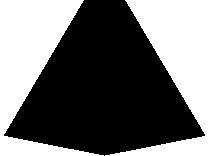Kohte
The Kohte [ˈkoːtə] is the typical tent of German Scouting and the German Youth Movement. It has several unusual features, including its distinctive black colour and its design to allow a central fire.

German Scout camp, consisting of a number of Kohtes.
History
Around 1930, Eberhard Koebel developed the kohte as a variation of the Sami lavvu and it quickly became popular within the Bündische Jugend. In 1935, its use was banned throughout Germany by Hitler Youth official Arthur Axmann; groups still using it were considered "cultural bolshevists" and prosecuted.
After World War II, the kohte was reintroduced and it became the most used type of tent in German Scouting.
Construction

The shape of a kohtenblatt, one of four identical pieces that make up a kohte
There are several distinctive features of the kohte:[1]
- It is constructed from four identical, uniquely shaped, roughly triangular or trapezoidal pieces of heavy canvas, called kohtenblatt, each about 2 kg/4 lbs in weight. Because the pieces are separate, they can be distributed among the members of a camping party during travel. Black fabric is almost always used.
- The tent is suspended from an external A-frame of only two long poles and secured to the ground with eight pegs, all of which are commonly sourced from local wood rather than carried around by campers.
- The canvas tarpaulins are fastened together using a loop and grommet system, or a loop-strap system, depending on the manufacturer.
- A fire can be used inside the tent, with the design incorporating a covered smoke hole.
Variants and extensions
- Smaller shelters can be made from one or two individual kohte segments.
- A larger tent, the Jurte (yurt) is made using six kohte segments for the roof, and adding high vertical walls.
gollark: This is called an "autoformatter" and it already "exists".
gollark: Try knowing Macron more.
gollark: Unfortunately, the macro is 1.3GB, although it *is* very elegant.
gollark: Although it *is* impressive that it's possible to express the entire text editing workflow in one glorious macro.
gollark: I don't particularly like it.
References
- "The black Tents of the German Scouts", Fichtelgebirge District Scouts
External links
- 75 Jahre Kohte – mit der Freischarlilie fing es an (in German); About the history of the Kohte.
- Schwarzzeltarchiv (in German); Archive of documents and history about the Kohte, including instructions for set-up.
This article is issued from Wikipedia. The text is licensed under Creative Commons - Attribution - Sharealike. Additional terms may apply for the media files.
.svg.png)